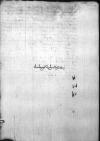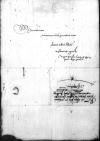List #701
Ioannes DANTISCUS do Piotr TOMICKIBrussels, 1531-10-22
Rękopiśmienne podstawy źródłowe:
Pomocnicze podstawy źródłowe:
Publikacje:
| ||||||||||||||||||||||||
Tekst + aparat krytyczny + komentarz Zwykły tekst Tekst + komentarz Tekst + aparat krytyczny
Reverendissimo in Christo Patri et Domino, domino
Reverendissime in Christo Pater et Domine, Domine Observandissime.
Plurimam obsequiorum meorum commendationem.
Cum ista nocte hinc a domino suo serenissimo
Mitto hic nescio quae de cometis. Quae alias hic aguntur, scripsi in compendio ad serenissimam
Ex
Reverendissimae Dominationis Vestrae deditissimus


